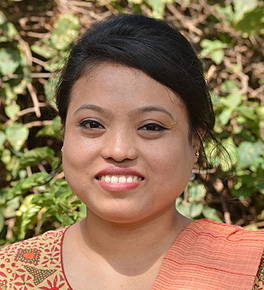OUR FELLOWS

OUR FELLOWS
Bisakha Dewan comes from Rangamati District, an area in the Chittagong Hills Tract (CHT), Bangladesh, where the traditional jhum
or “slash and burn” type of agriculture is practiced. “There is very little flat agricultural land available, so the farming communities use this method to clear the bushes on the hills, followed by planting using the broadcast method,” she explains. This farming method has negative effects on the environment, creating soil erosion and pollution. Dewan laments that farmers in the region rarely practice value addition, which would improve their incomes from agriculture. “Few modern agricultural technologies are practiced in the region, which has led to generations producing the very same agricultural products,” she says. “Ideally, you could make more money if you dry or pickle vegetables, or add more value—you could keep them longer and sell them at a later date.”
Few modern agricultural technologies are practiced in the region, which has led to generations producing the very same agricultural products,” she says. “Ideally, you could make more money if you dry or pickle vegetables, or add more value—you could keep them longer and sell them at a later date.
Field of Research
Dewan wants to contribute to social development in underdeveloped and developing countries, particularly targeting women smallholder farmers. With funding from SAURES, she is working on a project entitled: Micro-enterprise development through value chain development of non-food agricultural products on indigenous women in Rangamati Hill.
